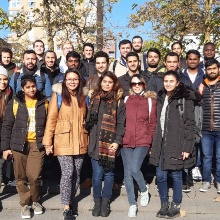Ein gut durchdachtes System von Infrastruktureinrichtungen ist die wichtigste Voraussetzung für Entwicklung. Auf internationaler Ebene besteht ein dringender Bedarf an Fachleuten, die Konzeption, Planung und Konstruktion nötiger Infrastruktureinrichtungen für Transport, Wasser- und Abfallmanagement im städtischen wie im regionalen Bereich leiten können und dabei wirtschaftliche, soziale, ökologische und verwaltungstechnische Anforderungen berücksichtigen. Mit dem Masterstudiengang Infrastructure Planning (MIP) bietet die Universität Stuttgart bereits seit 1983 einen praxisorientierten und international hochgeschätzten Studiengang an.
Fakultätsmitglieder aus 12 verschiedenen Instituten sowie erfahrene Praktiker*innen stellen ihr Wissen einer begrenzten Anzahl von 35 bis 40 Studierenden pro Kurs zur Verfügung. Der Schwerpunkt liegt auf einem interdisziplinären Planungsansatz, der für die moderne Infrastrukturplanung sowie für eine internationale Kooperation grundlegend ist.
Um zum Studiengang zugelassen zu werden, müssen Studierende über einen Bachelorabschluss in Architektur, Bauingenieurwesen, Stadt- oder Raumplanung oder in einem verwandten Studiengang verfügen. Professionelle Erfahrung in einem der genannten Bereiche ist von Vorteil. Zudem werden ausgezeichnete Englischkenntnisse vorausgesetzt. Studierende sollten an einem interdisziplinären Raumplanungsansatz interessiert und bereit sein, interkulturelle Erfahrungen zu sammeln.
Allgemeine Links
Akkreditierung

Kontakt

Elke Schneider
Course Director

Marion Aschmann
Dr.Course Director


